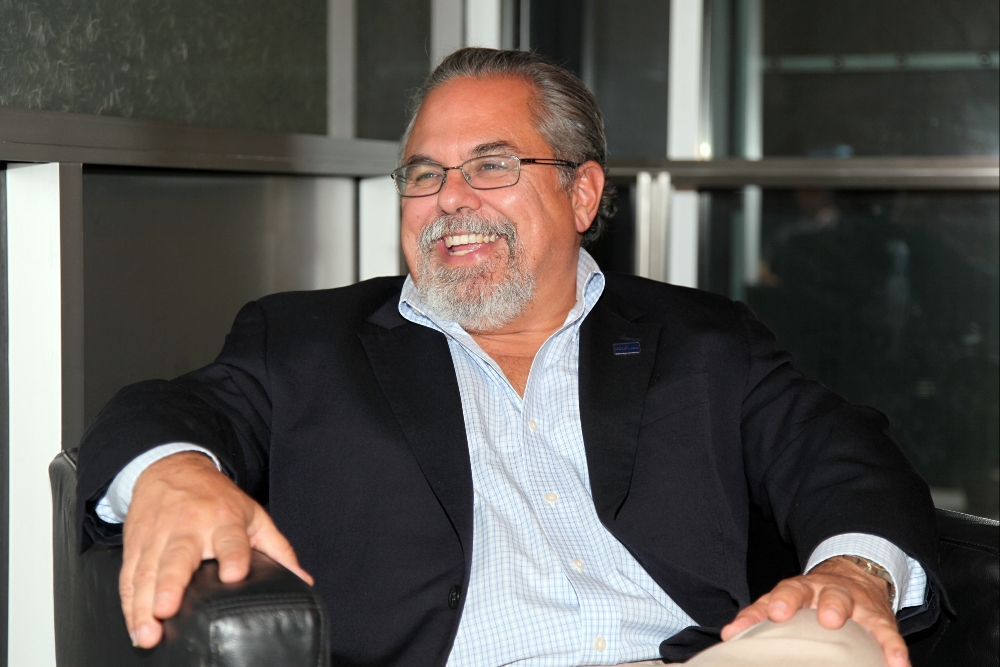
Photo by Aaron Salcido.
Gary Segura became dean of the UCLA Luskin School of Public Affairs in January 2017. Previously he served as a professor at Stanford University. His research focuses on issues of political representation and social cleavages, the domestic politics of wartime public opinion, and the politics of America’s growing Latino minority. Before joining a Zócalo/AARP panel discussion titled “Are Housing Prices Destroying the California Dream?” at the National Center for the Preservation for Democracy in downtown Los Angeles, he talked about polling, politics, and the beauty of California.
What’s the last book you read?
That’s a hard question for me to answer because I’m reading so many books at one time. The New Jim Crow by Michelle Alexander is the last book I read cover to cover.
What’s the one dessert you can’t resist?
Crème brûlée.
Do you spend 30 percent or more of your income on housing?
Oh, yeah.
If money were no object, where in California would you buy a home?
On the coast, probably either in the La Jolla/North San Diego area or maybe in Carmel, Monterey, mid-Central Coast.
What’s the hardest thing about academic administration?
Bureaucracy.
What do you miss most about Northern California?
It’s very green, it’s very beautiful. I lived on the peninsula, north of Stanford, and one mile from my house was just open green space. And that’s hard to find in L.A.
What’s the most difficult political challenge about leading an association of political scientists?
Keeping people who have a job for life happy.
How does war change public opinion?
For the United States, the most visible cost associated with war is battle death, the loss of soldiers. Since the Civil War, we haven’t had much conflict visited on our soil, compared to what other nations have experienced. The arguments my colleagues and I make is that war losses, the death of soldiers, is the single most important factor in how people shape their opinion. And they’re willing to support war if they think the losses are worth the goals of the war.
What was the first time you felt well represented politically?
It was in the election of 1992, and after 12 years of GOP rule, Bill Clinton was elected by a landslide in the Electoral College. And Dianne Feinstein and Barbara Boxer were both elected to the U.S. Senate. It was a big win. I was on the corner of Castro and 18th Street, and at midnight giant figures of Ronald Reagan, George Bush, and Dan Quayle were marched down the street and thrown into the a pile and burned as thousands of gay and lesbian San Franciscans sang, “Ding Dong, the Wicked Witch is Dead.”
Who is your favorite justice of the Supreme Court?
Sotomayor, and not just for her opinions. There is a great story about her and Justice Ginsburg after Justice Ginsburg’s husband had passed away. At the end of every court term, they have a follies show, and the clerks put on the skits. Justice Ginsburg was present and she was quiet because her husband had just passed away. When the show was over, Sotomayor started playing salsa music, and she went and dragged Scalia out, and she and Scalia were dancing. And then she went over and grabbed Justice Ginsburg and pulled her up and they danced, and Justice Ginsburg started to smile. And Justice Ginsburg put her hands on both sides of Sotomayor’s face and said, “Thank you.”
What’s the biggest misconception Americans have about political polls?
Most Americans don’t understand the law of large numbers and the central limit theorem, which are the two mathematical tools that allow us to use a thousand interviews to approximate 200 million adult American citizens.
When you turn on your TV, what channel would be the most likely to be on?
It would be a tie between MSNBC and HGTV.
What’s your favorite question?
That one.



